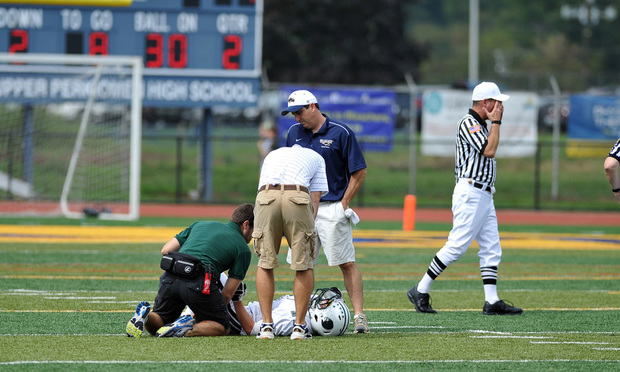Pa. Justices Back Off Broad Duty for Colleges to Provide Medical Staff at All Sports Events
Although the ruling reversed the Superior Court's decision establishing a broad duty to provide medical personnel, the court ultimately sent the case back to the Lackawanna County Court of Common Pleas for further consideration.
August 20, 2019 at 05:14 PM
4 minute read
 Photo: Shutterstock
Photo: Shutterstock
The Pennsylvania Supreme Court has overturned a Superior Court decision that established a duty for all colleges to provide qualified medical personnel for student athletes at all sports events, including tryouts and practices.
The high court ruled Tuesday in Feleccia v. Lackawanna College, wading into several questions about the duties schools may owe to student athletes and the ways those duties are assumed or waived. Although the ruling reversed the Superior Court’s decision establishing a broad duty to provide medical personnel, the court ultimately sent the case back to the Lackawanna County Court of Common Pleas for further consideration.
“We hold appellants had a duty to provide duly licensed athletic trainers for the purpose of rendering treatment to its student athletes participating in athletic events, including the football practice of March 29, 2010, and there is a genuine issue of material fact regarding whether appellants breached this duty,” Justice Kevin Dougherty, writing for the court’s 5-2 majority, said.
The ruling further held that, although the waiver student athletes signed immunized the school against claims of negligence, the waiver was unenforceable regarding the plaintiffs’ claims of gross negligence.
“The same policy concerns that prohibit the application of a waiver in cases of recklessness—i.e. allowing it would incentivize conduct that jeopardizes the signer’s health, safety and welfare to an unacceptable degree—requires a similar holding with regard to gross negligence,” Dougherty said.
The lawsuit stems from an incident involving plaintiffs Augustus Feleccia and Justin T. Resch. The two were trying out for Lackawanna College’s football team in March 2010 when they were injured performing a variation of the “Oklahoma drill,” which has been criticized in the wake of the National Football League concussion litigation. Resch suffered a T-7 vertebral fracture when he attempted to make a tackle with his head down. Feleccia endured a “stinger” after his first attempt at a tackle and felt numb in his right shoulder, but was told by defendant Alexis D. Bonisese, a member of the team’s medical staff, that he could return to practice, the opinion said. He then suffered a traumatic brachial plexus avulsion.
The athletes sued Bonisese and Kaitlin M. Coyne, whom the college had hired as athletic trainers and retitled as “first responders” upon realizing that they were not certified or licensed to serve as athletic trainers, the opinion said. They were the only training staff working with the team on the day of the injuries. The college, its athletic director and its coaches were also defendants.
The Lackawanna County Court of Common Pleas granted summary judgment based on a waiver the players had signed before the drill and, alternatively, based on the assumption of risk. Feleccia and Resch argued on appeal that the waiver cannot be used as a shield against the claims of gross negligence and recklessness they alleged. The college argued the waiver’s clear language demonstrated the students’ intent to release the college of all liability.
The Superior Court, however, determined that two football players could proceed with their claims, finding that a genuine issue of material fact existed regarding the players’ assumption of risk.
On appeal, the Supreme Court determined that the Superior Court’s ruling “articulated a duty not previously recognized by Pennsylvania courts,” but that was not necessary because the case could be analyzed through existing statutes and common-law duties of care.
The court relied on the recent case Dittman v. UPMC, which held that employers had a common-law duty to safeguard their employees’ personal information stored online. The school’s alleged conduct, including having all athletes consent to treatment by medical staff and holding out Bonisese and Coyne as qualified athletic trainers, was sufficient to establish a duty to survive the summary judgment phase, Dougherty said.
“Application of these legal principles to the present factual scenario supports a determination that ‘affirmative conduct’ by appellants created a ‘special relationship’ with and increased risk of harm to its student athletes such that appellants had a duty,” Dougherty said.
Chief Justice Thomas Saylor and Justice David N. Wecht each issued a concurring and dissenting opinion.
West Chester attorney Andrew Motel of the Law Offices of Andrew P. Motel, who represented the plaintiffs, said, “I’m obviously pleased with the outcome, and we will go back to Scranton and do what comes next.”
Kleinbard attorney Steven Engelmyer, who represented the defendants, declined to comment.
This content has been archived. It is available through our partners, LexisNexis® and Bloomberg Law.
To view this content, please continue to their sites.
Not a Lexis Subscriber?
Subscribe Now
Not a Bloomberg Law Subscriber?
Subscribe Now
NOT FOR REPRINT
© 2025 ALM Global, LLC, All Rights Reserved. Request academic re-use from www.copyright.com. All other uses, submit a request to [email protected]. For more information visit Asset & Logo Licensing.
You Might Like
View All

Am Law 100 Lateral Partner Hiring Rose in 2024: Report


Trending Stories
- 1Uber Files RICO Suit Against Plaintiff-Side Firms Alleging Fraudulent Injury Claims
- 2The Law Firm Disrupted: Scrutinizing the Elephant More Than the Mouse
- 3Inherent Diminished Value Damages Unavailable to 3rd-Party Claimants, Court Says
- 4Pa. Defense Firm Sued by Client Over Ex-Eagles Player's $43.5M Med Mal Win
- 5Losses Mount at Morris Manning, but Departing Ex-Chair Stays Bullish About His Old Firm's Future
Who Got The Work
J. Brugh Lower of Gibbons has entered an appearance for industrial equipment supplier Devco Corporation in a pending trademark infringement lawsuit. The suit, accusing the defendant of selling knock-off Graco products, was filed Dec. 18 in New Jersey District Court by Rivkin Radler on behalf of Graco Inc. and Graco Minnesota. The case, assigned to U.S. District Judge Zahid N. Quraishi, is 3:24-cv-11294, Graco Inc. et al v. Devco Corporation.
Who Got The Work
Rebecca Maller-Stein and Kent A. Yalowitz of Arnold & Porter Kaye Scholer have entered their appearances for Hanaco Venture Capital and its executives, Lior Prosor and David Frankel, in a pending securities lawsuit. The action, filed on Dec. 24 in New York Southern District Court by Zell, Aron & Co. on behalf of Goldeneye Advisors, accuses the defendants of negligently and fraudulently managing the plaintiff's $1 million investment. The case, assigned to U.S. District Judge Vernon S. Broderick, is 1:24-cv-09918, Goldeneye Advisors, LLC v. Hanaco Venture Capital, Ltd. et al.
Who Got The Work
Attorneys from A&O Shearman has stepped in as defense counsel for Toronto-Dominion Bank and other defendants in a pending securities class action. The suit, filed Dec. 11 in New York Southern District Court by Bleichmar Fonti & Auld, accuses the defendants of concealing the bank's 'pervasive' deficiencies in regards to its compliance with the Bank Secrecy Act and the quality of its anti-money laundering controls. The case, assigned to U.S. District Judge Arun Subramanian, is 1:24-cv-09445, Gonzalez v. The Toronto-Dominion Bank et al.
Who Got The Work
Crown Castle International, a Pennsylvania company providing shared communications infrastructure, has turned to Luke D. Wolf of Gordon Rees Scully Mansukhani to fend off a pending breach-of-contract lawsuit. The court action, filed Nov. 25 in Michigan Eastern District Court by Hooper Hathaway PC on behalf of The Town Residences LLC, accuses Crown Castle of failing to transfer approximately $30,000 in utility payments from T-Mobile in breach of a roof-top lease and assignment agreement. The case, assigned to U.S. District Judge Susan K. Declercq, is 2:24-cv-13131, The Town Residences LLC v. T-Mobile US, Inc. et al.
Who Got The Work
Wilfred P. Coronato and Daniel M. Schwartz of McCarter & English have stepped in as defense counsel to Electrolux Home Products Inc. in a pending product liability lawsuit. The court action, filed Nov. 26 in New York Eastern District Court by Poulos Lopiccolo PC and Nagel Rice LLP on behalf of David Stern, alleges that the defendant's refrigerators’ drawers and shelving repeatedly break and fall apart within months after purchase. The case, assigned to U.S. District Judge Joan M. Azrack, is 2:24-cv-08204, Stern v. Electrolux Home Products, Inc.
Featured Firms
Law Offices of Gary Martin Hays & Associates, P.C.
(470) 294-1674
Law Offices of Mark E. Salomone
(857) 444-6468
Smith & Hassler
(713) 739-1250





